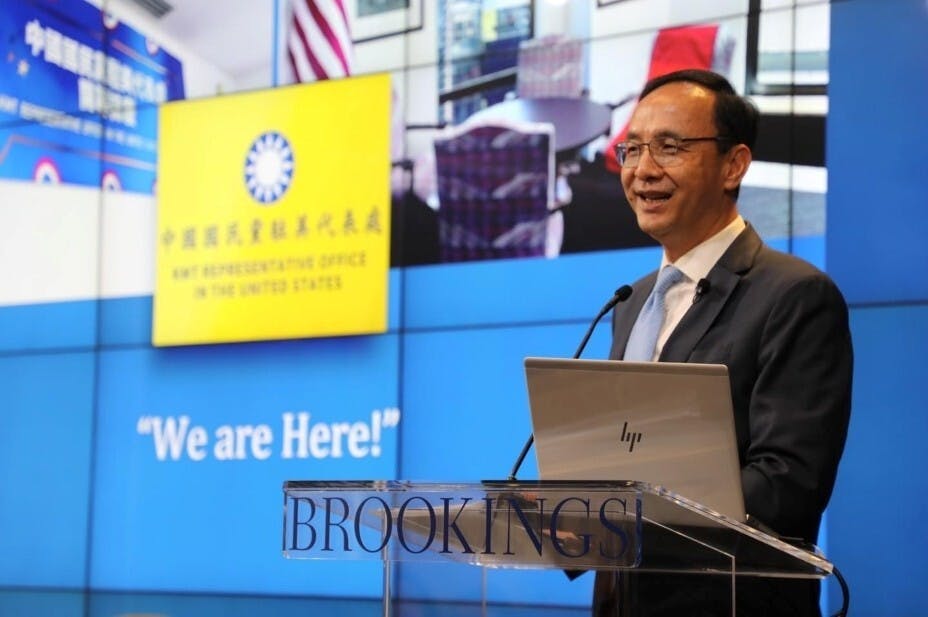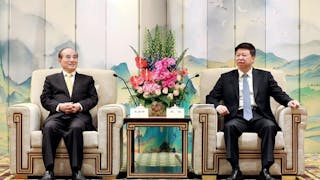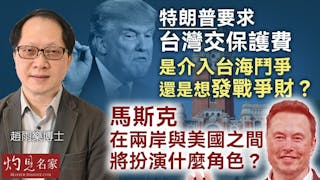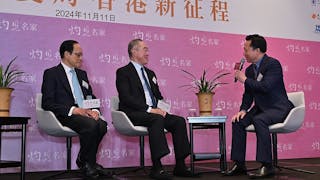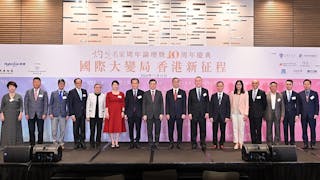台灣的國民黨主席朱立倫訪美,不僅對國民黨與美國的關係,也對台灣與大陸的關係具有重大的政治意義。
6月2日,首日美國之行的朱立倫訪問史丹福大學胡佛研究所,他表示看好國民黨將在2022年11月的縣市長選舉中有好表現,國民黨將提名可贏得2024年總統大選的「最佳候選人」。他強調,國民黨與美國關係密切,100多年來一直有「對抗共產主義」的立場。朱立倫堅稱,國民黨要把「捍衛中華民國」、「保衛台灣」放在第一要務。
否認「反美賣台」 要做東西方橋樑
值得注意的是,朱立倫在史丹福大學會見了一些美國專家,包括政治學家戴雅門(Larry Diamond)、印太問題專家祁凱立(Kharis Templeman)、亞洲協會美中關係中心主任夏偉(Orville Schell)、地緣政治學者歐斯林(Michael Austin)、退役上將艾理斯(James O. Ellis)、歷史學家譚安(Glenn Tiffert)、專欄作家、胡佛研究所訪問學者庫納賴吉斯(Markos Kounalakis)、人工智能技術研究員添比(James Timbie)、核能政策專家費多(David Fedor)、國際關係學者趙雅芬(Erin Ashley Baggott),以及政治學博士生羅勉等。
6月5日,在華盛頓與海外台灣人舉行的宴會上,朱立倫表示,國民黨的形象被描繪成「反美」和「賣台」,這損害了國民黨的形象。朱立倫還說,他希望下屆被選為總統候選人的國民黨人能與美國建立溝通渠道,而這個渠道與自己沒有任何關係。朱立倫暗示他不會參加國民黨內總統候選人的角逐。
6月6日,朱立倫在布魯金斯學會發表演講,強調台灣可以成為「國際秩序與規範的穩定器」、「民主的捍衛者」和「東西方的橋樑」。 不過,朱立倫並未詳細說明國民黨如何充當美國與中國大陸之間的「橋樑」。 他說國民黨是「親美的」、「親和平的」、「親民主的」。 朱立倫說,在意識形態上,台灣與美國共享自由主義價值觀。如此一來,台灣不僅可以而且將會幫助西方了解中國大陸,也可以促進中國、西方、日本和東南亞之間的開放和文化互動。
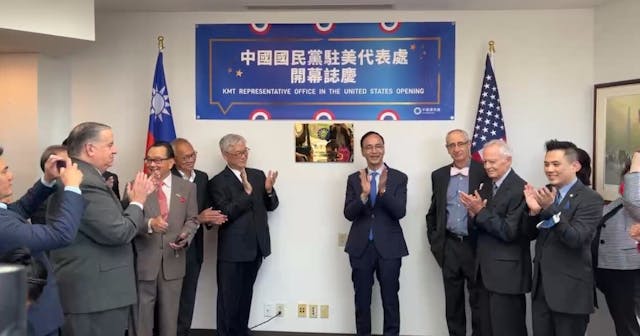
重開國民黨代表處 冀反映台灣人觀點
朱立倫在與美方與會者的對話中表示,重新開放國民黨駐美代表處將反映台灣民眾對美方的「部分」看法。他6月6日在布魯金斯學會的評論與他6月2日在史丹福大學的言論相呼應,當時他提到國民黨代表處將使美國人能夠更全面地了解台灣民眾的觀點,而不會由少數人或特定政黨壟斷台灣的輿論。朱立倫暗示,國民黨駐華盛頓代表處將讓美國政府和中國專家能夠挖掘台灣社會更廣泛的觀點,而不僅是在美國聽取台灣執政民進黨及其代表的一面之詞。
「沒有共識的共識」 兩岸再爆口水戰
朱立倫此次訪美,最具煽動性的言論莫過於他對1992年中國大陸與國民黨達成的共識,即只有一個中國,但「一個中國」的解釋是雙方各自表述。令人驚訝的是,朱立倫將九二共識稱為「沒有共識的共識」,並補充說這種共識是一種「創造性的模糊」。
「沒有共識的共識」這句話立即引起民進黨方面和中國大陸評論界的反應。民進黨6月7日對朱立倫的言論迅速作出反應,稱九二共識並沒有真正給台灣方面任何「模糊或共識」的空間。民進黨批評朱立倫的國民黨「漠視國際現勢」,「對維護台灣國家安全與尊嚴毫無助益」。民進黨又指,台灣的大陸委員會6月2日公布的調查結果顯示,超過八成台灣民眾不認同「一中原則」與「九二共識」。
大陸《環球時報》的評論員胡錫進批評國民黨淪為「小民進黨」和「泡沫化」。胡錫進說,很多大陸人聽到朱立倫將九二共識稱為「沒有共識的共識」,「聽着刺耳,很不舒服」,因為朱立倫的表態與國民黨前主席馬英九時期相比,是倒退了。胡錫進補充說,國民黨比以往任何時候都軟弱,部分是由於台灣輿論的壓力,部分是因為美國的態度。
胡錫進寫道:「我們當然不喜歡國民黨態度上的倒退,但我們生他們氣,罵他們『百年爛黨』都沒用,大陸方面唯有通過我們自己的行動向島內施加更大影響,才能避免島內的政治氛圍被『台獨』勢力綁架,讓一個中國的主張在那裏不斷擴大政治生存的空間。」
6月9日,國台辦發言人馬曉光回答記者對朱立倫就九二共識發表的評論有何反應的提問,馬曉光表示,九二共識不容任意「扭曲」,中國共產黨和國民黨之間「堅持一個中國原則、追求國家統一的立場和態度,白紙黑字清清楚楚」。馬曉光的回應表明,大陸的的官方立場九二共識是明確的。
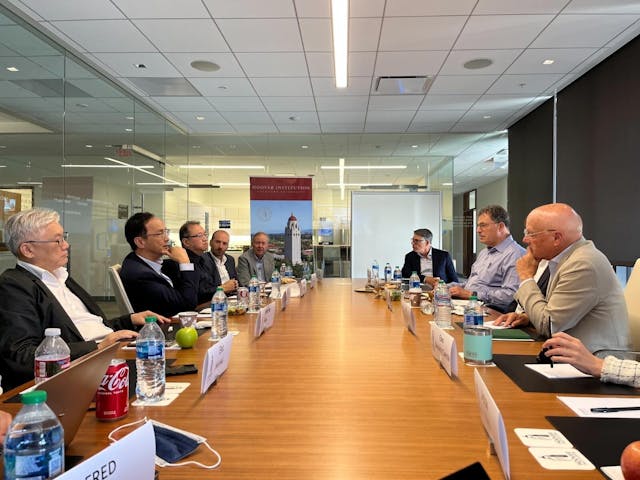
洪秀柱抨擊民進黨 藍營兩派唱雙簧?
巧合的是,6月7日,國民黨前主席洪秀柱正在北京訪問。她說,台灣和大陸的炎黃子孫不應該被任何「霸權主義」和「干涉主義」挑撥離間,民進黨拒不承認九二共識,更在下一代的教育推行去中國化,讓兩岸下一代的心靈距離日漸遙遠。
朱立倫訪美具有巨大的政治意義。首先,在國民黨與美國關係方面,政治上日益軟弱的國民黨重新在華盛頓設立辦事處,讓美國政客和政府官員更能掌握台灣支持統一政黨的觀點。
其次是國民黨在政治上仍分為深藍和淺藍兩大陣營,以洪秀柱為代表的深藍陣營為少數派,以朱立倫為首的淺藍陣營為主流派。
由於台灣的政治氣候和輿論,淺藍陣營自然對九二共識採取不那麼堅定的立場;不過,國民黨復興能否在朱立倫的領導下取得成功,還有待觀察。
報道指,朱立倫正培養蔣萬安作為台北市長參選人。如果蔣萬安能贏得選舉,他將被培養成國民黨的明日之星,就像1998年當選台北市長的馬英九一樣。還有報道稱,朱立倫可能培養和支持現任新北市市長侯友宜成為2024年國民黨總統參選人。朱立倫能否成功通過培養侯友宜和蔣萬安來復興、重組、振興國民黨,還有待觀察。但有一點很清楚:朱立倫對九二共識的言論表明,淺藍陣營在避免明顯的「親中國」形象方面持謹慎態度,這可能會成為台灣激烈角逐的縣市長選舉和總統選舉的一個負擔。
理想情況下,以朱立倫為首的國民黨淺藍陣營可以清晰地描繪成作為美國與中國大陸之間的橋樑,一方面可以與中國大陸對話,並與執政的民進黨有效競爭的穩定器形象。另一方面,在選舉市場上。如果國民黨的橋樑作用能夠得到鞏固,其在台灣選舉中的前景可能會得到支持,因為大多數台灣人都希望看到穩定的兩岸關係。
綜上所述,朱立倫此次訪美及其言論,對國民黨與美國的關係,以及兩岸關係均具有重要的政治意義。美國政界和官員可以聽取台灣支持統一政黨的觀點和看法。儘管如此,以朱立倫為首的淺藍陣營可以說是一股「軟性」支持統一的力量,對九二共識的態度不如洪秀柱、張亞中所代表的深藍陣營堅決,他們可被視為國民黨內部的「堅定」支持統一的力量。在即將到來的縣市長選舉中,淺藍陣營的對大陸態度和政策很可能會保持謹慎。然而,如果國民黨各派能在如何鞏固和釐清黨的橋樑作用上團結一致,由現在至2024年總統大選前的日子裏,兩岸關係甚至中美關係或許會有潛在性的突破。
Eric Chu’s Visit to US and Its Political Implications
The visit of Eric Chu, the chairperson of the Kuomintang (KMT) or the Nationalist Party in Taiwan, to the United States has significant political implications for not only the KMT-US relations but also Taiwan’s relations with the mainland.
On June 2, when Chu embarked on the first day of his US trip, he visited the Hoover Institution at Stanford University, saying that he was optimistic about the KMT performance in the county and mayoral elections by November 2022, and that the KMT would nominate its “best candidate” to win the 2024 presidential election. He stressed that the KMT has close relations with the US and that it had a long-standing position of “resisting communism” for one hundred years. Chu asserted that the KMT’s priority was to “defend the Republic of China (ROC)”and “put the defense of Taiwan as the first task.”
It is noteworthy that Chu met some American experts at Stanford University, including political scientist Larry Diamond, Indo-Pacific specialist Orville Schell, geopolitical expert Michael Austin, retired general James O. Ellis, historian Glenn Tiffert, columnist Markos Kounalakis, artificial intelligence researcher James Timbie, nuclear policy expert David Fedor, international relations expert Erin Ashley Baggott, and political science doctoral candidate Jason Mian Luo.
On June 5, during a banquet with the overseas Taiwanese in Washington, Eric Chu said that the KMT image was tarnished by portraying his party as “anti-US” and “betraying Taiwan.” Chu added that he hoped the KMT candidate who would be selected to run for the next Taiwan presidential election would establish a communication channel with the US, and that such channel had no relations with himself. Chu implied that he would not run for the KMT’s internal selection of presidential candidates.
On June 6, Chu delivered a speech at the Brookings Institution, emphasizing that Taiwan can be “a stabilizer of the international order,” “a defender of democracy,” and “a bridge between East and West.” However, Chu did not elaborate on how the KMT could serve as a “bridge” between the US and mainland China. He remarked that the KMT is “pro-US,” “pro-peace” and “pro-democracy.” Ideologically, Taiwan has shared the values of liberalism with the US, according to Chu. As such, Taiwan can and will not only help the West to understand mainland China but also promote the openness and cultural interaction between China, the West, Japan and Southeast Asia.
In his dialogue with the American participants, Chu said that the reopening of an office of the KMT in the US would “partially” reflect the views of the Taiwan people to the American side. His comment at the Brookings Institution on June 6 echoed what he had said at Stanford University on June 2, when he had mentioned that the KMT office would enable the Americans to understand the perspectives of the Taiwan people more comprehensively without the monopolization of Taiwan’s public opinion by a minority of people or a specific political party. By implication, Chu emphasized that the KMT office in Washington would let the US government and China experts to tap the views of a broader spectrum of Taiwan’s society without just listening to the dominant views articulated by the ruling Democratic Progressive Party (DPP) and its representatives in the US.
The most provocative remark made by Eric Chu during his visit to the US was his comment on the 1992 consensus between mainland China and the KMT, namely there is only one China but the interpretation of “one China” was up to both sides. Surprisingly, Chu referred to the 1992 consensus as “non-consensus consensus,” and he added that such consensus was a kind of “creative ambiguity.”
The term “non-consensus” aroused an immediate reaction from the DPP side and mainland Chinese commentators. The DPP reacted to Chu’s remarks on June 7 quickly, saying that the 1992 consensus did not really give any “ambiguous” space to the Taiwan side. The DPP criticized Eric Chu’s KMT for “ignoring the international circumstances” without “any help and dignity to protect Taiwan’s national security and dignity (Liberty Times, June 7, 2022).” The DPP argued that the Mainland Affairs Council on June 2 published a survey result showing that “over 80 percent of the Taiwan people do not identify themselves with the 1992 consensus.”
A mainland commentator, Hu Xijin, from Global Times,criticized the KMT of becoming “a small DPP” and “a bubble.” Hu said that many mainland Chinese people who heard Chu’s reference to the 1992 consensus as “non-consensus consensus” felt “very uncomfortable,” because the KMT chairperson made a retrogressive step in comparison with the period of former KMT president Ma Ying-jeou. Hu added that the KMT has become much weaker than ever before, partly due to the pressure of public opinion in Taiwan and partly because of the US attitude.
Hu wrote: “We of course dislike the retrogressive attitude of the KMT, but even if we are angry and scold the KMT – thedegenerating party of one hundred years – this is useless. The mainland can only rely on its action to exert more influences on the island so that the island’s political atmosphere would not be hijacked by the forces of ‘Taiwan independence,’ and that the survival space in the advocacy of one China would continue to expand (Ming Pao, June 9, 2022, p. A14).”
On June 9, the Taiwan Affairs Office’s spokesperson, Ma Xiaoguang, was asked by a reporter on his reaction to Eric Chu’s comment on the 1992 consensus. Ma replied that the 1992 consensus should not be “distorted,” that the consensus between the Communist Party of China and the KMT in “persisting the one-China principle and pursuing national reunification” was “written black and white clearly” (see the website of the Taiwan Affairs Office of the State Council, www.gwytb.gov.cn, June 9, 2022). The response from Ma showed that the official position of the People’s Republic of China (PRC) is that the 1992 consensus is clear.
Coincidentally, on June 7, the former chairlady of the KMTHung Hsiu-chu was visiting Beijing. Hung said that the Chinese people across Taiwan and the mainland should not be intervened by any “hegemonic power,” that the DPP does not recognize the 1992 consensus, that Taiwan is experiencing a process of “de-Sinification,” and that the next generation of Taiwan people would have an identity distant from the mainland (Sing Tao Daily, June 7, 2022).
Chu’s visit to the US has tremendous political implications. First, in terms of the KMT-US relations, the increasingly politically weak KMT has reestablished its office in Washington and allowed the US politicians and government officials to grasp the perspectives of the pro-reunification party.
Second, the KMT remains politically divided into the dark blue and light blue camps, with the dark blue camp represented by Hung Hsiu-chu as the minority force and the light blue camp led by Eric Chu as the dominant force.
The light blue camp naturally adopts a less firm position on the 1992 consensus due to the political market and public opinion in Taiwan; nevertheless, it remains to be seen whether the KMT rejuvenation can and will be successful under the leadership of Eric Chu.
It is reported that Chu is trying to groom Wayne Chiang Wan-an as the candidate running for the election of the Taipei mayor. If Chiang can win the election, he will be groomed as the rising star in KMT, like Ma Ying-jeou who was elected as the Taipei mayor in 1998. It is also reported that Chu may groom and support Hou Yu-ih, the current mayor of the New Taipei City, as the KMT presidential candidate in 2024. It remains to be seen whether Eric Chu will succeed to revive, reorganize, reinvigorate the KMT by grooming Hou and Chiang. But one thing is clear: Chu’s remarks on the 1992 consensus show that the light blue camp is cautious in avoiding an explicitly “pro-China” image, which will likely be a liability in Taiwan’s bitterly fought local and national elections.
Ideally, the KMT’s light blue camp led by Eric Chu can portray a clear image of being the bridge between the US and mainland China, and of being the stabilizer who can have dialogue with mainland China on the one hand and compete with the ruling DPP effectively in the electoral market on the other hand. If the bridging function of the KMT can be consolidated, its electoral prospects in Taiwan’s elections will likely be bolstered as most Taiwan people prefer to witness stable cross-strait relations.
In conclusion, Eric Chu’s visit to the US and his remarks have important political implications for KMT-US relations and cross-strait relations. The American politicians and officials canlisten to the views and perspectives of the pro-reunification party in Taiwan. Nevertheless, the light blue camp led by Eric Chu can be regarded as a “soft” pro-reunification force, showing a less firm attitude toward the 1992 consensus than the dark blue camp as epitomized by Hung Hsiu-chu and Chang Ya-chung, who can be seen as the “hard” pro-reunification force within the KMT. It is likely that the light blue camp will remain cautious in its attitude and policy toward China in the forthcoming county and mayoral elections. Yet, if the KMT factions can be united in their attitude toward how the party’s bridging function can be consolidated and clarified, cross-strait relations and even Sino-American relations would perhaps have a potential breakthroughin the years leading to the 2024 presidential elections.
原刊於澳門新聞通訊社(MNA)網站,本社獲作者授權轉載。



